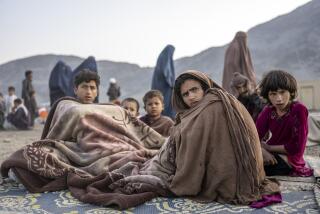Nations Vow to Hunt Terrorists Together
- Share via
KABUL, Afghanistan — Pakistani President Pervez Musharraf, making his first visit ever to this country, promised Tuesday to work with his “Afghan brothers” to weed out terrorists on both sides of the rugged, mountainous border between the two Muslim nations.
With interim Afghan Prime Minister Hamid Karzai by his side, Musharraf also sought to minimize Pakistan’s wholehearted support for the Taliban regime before Sept. 11, saying the two countries now had a common goal of finishing off any remaining Taliban and Al Qaeda leaders and fighters.
Guarded by heavily armed security details from Pakistan, Afghanistan and the U.S., Musharraf said American troops were not needed to pursue terrorists into his nation because thousands of Pakistani soldiers were providing the necessary manpower and intelligence.
The president’s comments came during an hourlong news conference at which both he and Karzai said they had no idea whether Osama bin Laden was alive.
“I thought he was dead,” Musharraf said, referring to comments he made in January, when he said he believed that Bin Laden had died of kidney failure. “Now I can’t be sure.
“He may be dead or alive, I don’t know,” he added. “But if you ask my view, maybe he’s dead.”
Karzai said, “I really don’t know where Bin Laden is.”
The sight of the two leaders sitting together, joking and chatting inside the presidential palace here in the capital, provoked a mixed reaction among Afghans. Many are deeply suspicious of Pakistan, despite its support for moujahedeen fighters during Afghanistan’s 10-year war against Soviet occupation.
Until Musharraf abruptly shifted course under U.S. pressure after Sept. 11, Pakistan’s military and intelligence networks had worked closely with Afghanistan’s fundamentalist Taliban regime. Pakistan also backed Taliban forces fighting the Northern Alliance, whose leaders now dominate the interim government’s military and security ministries. And after the U.S. military campaign began Oct. 7, thousands of Pakistanis poured into Afghanistan to fight alongside the Taliban and Al Qaeda.
“Sometimes there are differences between brothers,” Musharraf said as Karzai nodded. “I have no reason to believe we can’t overcome these differences.”
Musharraf dismissed his support of the Taliban as “a short part of the history . . . of excellent brotherly relations between Pakistan and Afghanistan.” He said he and Karzai had agreed not to focus on “the bitter memory of recent years.”
According to Karzai, Afghan Defense Minister Mohammed Qassim Fahim--who as a Northern Alliance commander fought Taliban forces backed by Musharraf--made a point of warmly greeting Musharraf on Tuesday morning.
“He called me a brother, and I called him a brother, and I said I mean every word of it,” Musharraf said, beaming.
Musharraf and Karzai said that in their second announced meeting since Karzai took office in December, they had discussed ways to cooperate in hunting down Taliban and Al Qaeda fighters on both sides of the border.
American commanders have said they expect to engage more pockets of resistance in the mountains of eastern Afghanistan as warmer weather allows greater movement of men and weapons.
Musharraf pointed to raids in Pakistani cities last week that resulted in the arrests of scores of suspected terrorists who had fled Afghanistan, including an Arab who U.S. officials have confirmed is Abu Zubeida, a top Al Qaeda strategist and recruiter. Pakistani officials announced Tuesday that 16 Arabs, Afghans and Pakistanis were arrested Monday night in follow-up raids on suspected Al Qaeda hide-outs in the northeastern city of Lahore.
Musharraf said the arrests showed that U.S. ground troops did not need to pursue Taliban and Al Qaeda fighters into Pakistan, though he added that the United States had not requested permission for such pursuit by its troops.
Pakistani forces “are very capable of taking action against intruders in our country,” he said. “The United States is feeling very comfortable operating with us. There is excellent communication between the U.S. forces and Pakistani forces at the strategic level and the tactical level.”
Asked about news reports that factions within Inter-Services Intelligence, Pakistan’s intelligence agency, continued to support the Taliban and Al Qaeda, Musharraf said he had given his “personal guarantee” to Karzai that Pakistan fully supports the interim government.
“The ISI is doing or not doing whatever I tell them or don’t tell them to do,” Musharraf said. “They are behaving exactly as we want them to.”
Karzai said Afghanistan would “look into” releasing an unspecified number of young Pakistani men captured as the Taliban was routed by U.S. and coalition forces. He said those who would be released are “boys, young men who have no relation to Al Qaeda or terrorism, who are simple folks.”
The two leaders ended their joint appearance with Karzai’s acceptance of a $10-million check from Musharraf to help rebuild Afghanistan and, the president told the interim prime minister, “to show solidarity with my brother here.”
More to Read
Sign up for Essential California
The most important California stories and recommendations in your inbox every morning.
You may occasionally receive promotional content from the Los Angeles Times.














